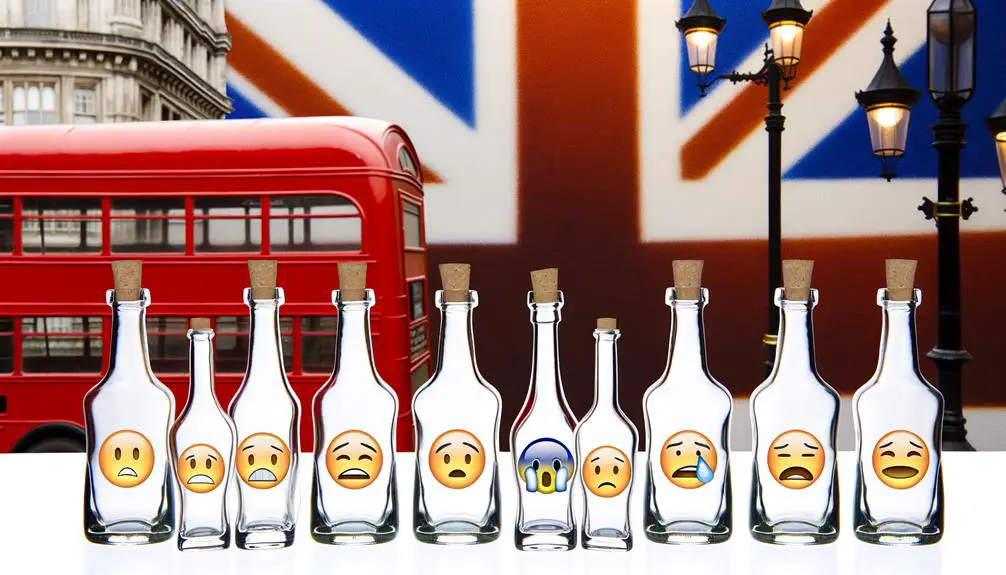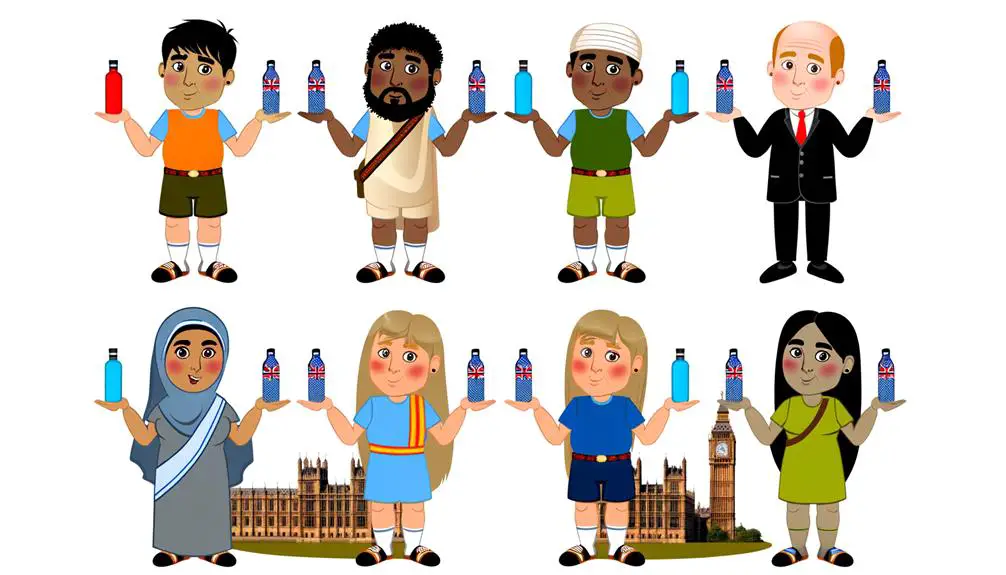In British slang, when you've "bottled it," you've succumbed to pressure, missing out on an opportunity due to a sudden loss of nerve. It's a vivid way of saying you've backed down when it mattered most, common in sports, work, and daily challenges. This phrase connects deeply with feelings of regret, embarrassment, and the immediate need for self-reflection. Synonymous with "chickened out" or "lost one's nerve," it highlights a moment of capitulation. Embracing this term involves acknowledging failure and the journey toward resilience and self-improvement. As you explore its nuances, you'll uncover layers of cultural insights and emotional intelligence, signaling growth.
Key Takeaways
- 'Bottled it' in British slang refers to failing under pressure or missing an opportunity due to a lack of nerve.
- It is commonly used to describe a sudden loss of courage or determination in critical moments.
- The phrase is versatile, appearing in various contexts such as sports, work, and social situations.
- 'Bottled it' shares similarities with expressions like 'chickened out' or 'lost one's nerve', indicating a retreat from challenge.
- It reflects a moment of vulnerability and is often used humorously or self-reflectively in British culture.
The Origin of 'Bottled It'

To understand the phrase 'bottled it', one must explore its origins, which trace back to British slang, encapsulating moments of failure or lost nerve. This exploration requires delving into the linguistic evolution of the term, which is not only fascinating but also reflects broader societal changes. Over time, the phrase has woven itself into the fabric of English vernacular, especially within the United Kingdom, becoming a succinct way to describe a moment of giving up or not following through due to a lack of courage or resolve.
The etymology debates surrounding 'bottled it' are as rich as they are complex. Scholars and linguists often find themselves at odds over the precise origins. Some theories suggest that it stems from rhyming slang or from historical practices related to bottling emotions or actions. Despite these debates, what's crystal clear is that 'bottled it' serves as a linguistic mirror, reflecting the nuances of both language development and cultural attitudes toward failure and fear.
Analyzing this phrase's journey through the lens of linguistic evolution provides a deeper appreciation for how language adapts and grows. It underscores the dynamic nature of slang and its power to succinctly capture complex human experiences.
Understanding British Slang
Plunging into British slang reveals a rich tapestry of expressions that offer insight into the UK's cultural psyche and social nuances. You're traversing a linguistic labyrinth where every twist uncovers colloquial gems steeped in history. The evolution of slang is a proof to the vibrant, ever-changing language landscape, reflecting societal shifts, technological advancements, and cross-cultural exchanges. As you explore further, you'll find that understanding these expressions is essential to grasping the essence of British communication, humor, and identity.
| Slang Evolution | Communication Barriers | Insights into Culture |
|---|---|---|
| Reflects societal changes | Can confuse non-natives | Offers cultural context |
| Incorporates global influences | May hinder clear understanding | Reveals social nuances |
| Adapts with technology | Requires contextual knowledge | Showcases humor and identity |
Slang's dynamic nature means it's continually adjusting, posing challenges and rewards for those looking to fully engage with British culture. While it may erect communication barriers for outsiders, it also serves as a bridge to deeper understanding and connectivity for those willing to learn. Your journey through British slang isn't just about decoding words; it's about opening a doorway to a richer, more intimate understanding of the people who use them.
Common Usage and Context

Having explored the broader landscape of British slang, let's now focus on the specific phrase 'bottled it', examining its common usage and context within UK communication. This term is mainly used in situations where there's a perceived failure due to a lack of nerve or courage. Sporting events serve as a prime example, where the pressure to perform is palpable. Imagine a footballer with the chance to score a match-winning penalty, only to miss the goal entirely. Observers might say the player 'bottled it', suggesting that in the moment of truth, their resolve faltered.
Workplace scenarios also provide a fertile ground for this expression. Consider a colleague who's been vying for a promotion, seemingly confident and prepared. Yet, when the opportunity to present their case arises, they stumble or withdraw entirely. Peers might whisper that they 'bottled it', indicating a failure to seize a critical opportunity due to a sudden loss of confidence or composure.
In these contexts, 'bottled it' encapsulates a moment where courage or determination is expected but absent, highlighting not just a failure of action, but of nerve. This precise, analytical understanding of its usage underscores the depth of meaning behind what might seem like a simple piece of slang.
Emotional Nuances Explored
Exploring the emotional nuances of 'bottled it', it's imperative to recognize the complex interplay of feelings involved in such moments of perceived failure. This phrase not only encapsulates a moment of backing down but also triggers a cascade of internal reflections that can lead to both negative and positive outcomes. To fully understand this, consider the following points:
- Immediate Regret and Disappointment: The initial reaction to 'bottling it' often involves a sharp sting of regret and disappointment. It's a moment where one confronts their limitations head-on, questioning their preparedness and resolve.
- Self-Reflection: Following the initial wave of disappointment, there's an opportunity for deep self-reflection. Individuals might analyze their actions (or inactions), considering why they hesitated and how they might respond differently in future situations.
- Failure Acceptance: An essential step in moving forward is accepting failure as a part of the growth process. Recognizing that not every opportunity will be seized and not every risk will be taken helps in normalizing the experience of fear and hesitation.
- Courage Building: Finally, these moments can serve as critical turning points for courage building. Understanding and accepting one's response to a challenging situation paves the way for personal development, encouraging a more resilient approach in the face of future challenges.
Through this lens, 'bottled it' becomes more than a moment of failure; it transforms into a valuable lesson in vulnerability, resilience, and the ongoing journey of self-improvement.
Related Phrases and Synonyms

In the world of British slang, 'bottled it' is closely aligned with phrases and synonyms that convey a similar sentiment of backing out or failing to follow through on intentions. This expression encapsulates a moment of surrender, often at the precipice of action, making it a poignant reference to failure examples and courage opposites in conversational and cultural contexts.
You'll find that 'bottled it' shares a kinship with phrases like 'chickened out' or 'lost one's nerve', each depicting a scenario where courage falters and resolve dissolves. These expressions highlight not just a momentary lapse but a significant retreat from challenge or responsibility. Analytically, they serve as linguistic markers of hesitation or fear, often employed to critique or lampoon a lack of steadfastness in the face of adversity.
Synonyms such as 'backed down', 'pulled out', or 'gave up' also thread into this tapestry of reticence, enriching the lexicon of failure and fear. These terms, like 'bottled it', are instrumental in dissecting moments of capitulation, offering a precise language for discussing the dynamics of courage and its absence.
Understanding these related phrases and synonyms enriches one's grasp of British slang, particularly in analyzing how language encapsulates the complex interplay of emotion, failure, and the human condition.
'Bottled It' in Popular Culture
Numerous instances of the phrase 'bottled it' permeate popular culture, offering a rich vein of analysis for understanding its impact and nuance in various contexts. This slang, deeply embedded in British culture, has found its way into the global lexicon, largely propelled by:
- Celebrity Examples: High-profile figures often find themselves under the microscope when they're perceived to have 'bottled it' during pivotal moments. Whether it's a missed penalty in football or a flubbed line during a live performance, these moments are dissected across media platforms, serving as powerful examples of the phrase in action.
- Film and Television: Scriptwriters sometimes incorporate 'bottled it' into dialogue to lend authenticity to British characters or settings, thereby reinforcing its usage and understanding among global audiences.
- Music Lyrics: British musicians occasionally weave 'bottled it' into their lyrics, contributing to its cultural resonance and emotional impact within songs that discuss failure or fear of taking action.
- Social Media Trends: Hashtags and viral challenges occasionally emerge around the concept of 'bottling it', encouraging users to share their own stories of moments when they've backed down or failed to act. This trend not only spreads the usage of the phrase but also democratizes its meaning, allowing for a broader interpretation based on personal experiences.
Through these avenues, 'bottled it' maintains its vibrancy within popular culture, continually evolving with each new generation's interpretation and application.
The Psychology Behind Fear

Understanding the phrase 'bottled it' offers insight into moments of hesitation or failure, which leads us to examine the underlying psychology of fear that often drives these actions. At its core, fear is an emotional response to perceived threats, important for survival. Yet, when fear becomes disproportionate to the actual risk involved, it can lead to avoidance behaviors, basically what's described when someone has 'bottled it'.
Fear conditioning, a fundamental aspect of this psychology, demonstrates how certain experiences can teach us to fear situations, objects, or actions. It's a learning process where previously neutral stimuli become associated with something unpleasant or frightening. Over time, this conditioning can result in anxiety disorders, where the fear response is triggered easily and often irrationally, severely impacting a person's daily life and decision-making processes.
In the context of 'bottling it', this conditioning could explain why some individuals might consistently avoid certain actions or decisions due to an exaggerated fear of negative outcomes. Understanding this can provide not just insight into personal behaviors but also a pathway to addressing these fears, through unlearning these conditioned responses and developing healthier coping mechanisms.
Reactions and Responses
You'll find that the phrase 'bottled it' triggers a range of emotional impacts and cultural interpretations, shedding light on how societies perceive failure and resilience. By exploring these reactions and responses, you gain insight into the complex interplay between language and emotion. This analysis helps you understand the nuances behind the term and its broader implications on personal and collective identities.
Emotional Impact
The phrase 'bottled it' often evokes strong emotional responses, as it implies a failure to follow through under pressure. This can lead to a journey of emotional reactions and responses that are both challenging and transformative. Here's a breakdown of what you might experience:
- Initial Disappointment: The immediate feeling when you realize you've 'bottled it', marked by a sense of letdown.
- Embarrassment: A natural reaction to public or even private acknowledgment of the moment you backed down.
- Failure Acceptance: The pivotal step of acknowledging the moment as a setback, not a defining trait.
- Overcoming Embarrassment: Moving past the initial shame to learn and grow from the experience.
Understanding these stages can be instrumental in maneuvering the emotional fallout of 'bottling it', leading to personal development and resilience.
Cultural Interpretations
Across cultures, reactions to 'bottling it' vary widely, reflecting deep-seated attitudes towards risk, failure, and resilience. You'll find that in some societies, the concept taps into broader social dynamics, where the fear of failure is heavily stigmatized, pushing individuals towards a constant pursuit of success. This cultural backdrop shapes the linguistic evolution of phrases like 'bottled it,' embedding them with nuanced meanings that resonate differently depending on one's cultural lens. In places where resilience is highly valued, 'bottling it' might not just denote a moment of failure but also a stepping stone towards growth and learning. Consequently, understanding these varied interpretations requires a keen awareness of the intricate web of social dynamics and linguistic evolution that define human communication and perception.
Variations Across the UK

As you explore the phrase 'bottled it' across the UK, you'll find regional slang differences that add layers to its meaning. Local usage nuances further refine its interpretation, depending on whether you're in Glasgow, Belfast, Cardiff, or London. This variation underscores the rich tapestry of British slang, revealing how location influences linguistic expression.
Regional Slang Differences
While exploring the nuanced phrase 'bottled it' within British slang, it's important to understand that its interpretation and usage can greatly vary depending on regional dialects across the UK. This variation underscores the rich tapestry of dialect evolution and linguistic diversity found throughout the region. Here's how:
- Northern vs. Southern Interpretations: In the North, 'bottled it' might carry a stronger connotation of cowardice, while in the South, it's used more liberally to denote any form of failure or backing out.
- Urban vs. Rural Contexts: Urban areas, with their fast-paced linguistic innovation, might see 'bottled it' evolve in meaning quicker than in rural settings.
- Scottish, Welsh, and Irish Variants: Each country within the UK brings its own flavor to the phrase, influenced by local dialects and languages.
- Age and Social Groups: Different generations and social circles might interpret or use 'bottled it' in unique ways, reflecting their collective identity.
Local Usage Nuances
Delving into the local usage nuances of 'bottled it' reveals a fascinating mosaic of variations throughout the UK, each reflecting the distinctive character of its region. As you explore these differences, you'll notice how slang evolution plays a significant role in shaping the phrase's impact and meaning, varying subtly from city to city. For instance, in some areas, 'bottled it' might carry a heavier connotation of cowardice or failure, while in others, it's used more lightheartedly. This diversity in usage underscores the importance of context and the influence of local culture on slang. Additionally, international comparisons highlight how uniquely British the expression remains, despite the global spread of English. Understanding these nuances gives you a richer appreciation of the phrase's versatility and depth.
Embracing the Phrase Today
In today's vernacular, 'bottled it' has transcended its origins, becoming a staple in conversations where you're pinpointing moments of failure or lost nerve. This evolution is greatly influenced by modern adaptations and the pervasive reach of social media influence. As you navigate through the use of 'bottled it' today, it's evident that its application is both widespread and nuanced. Here's how it's embraced:
- Online Platforms: Social media and forums have catalyzed the phrase's spread beyond British borders, making it a global reference for backing out or failing under pressure.
- Pop Culture: Television, music, and literature now frequently incorporate 'bottled it,' embedding it further into everyday language.
- Sports Commentary: It's a go-to term for commentators discussing athletes who falter at pivotal moments, encapsulating the drama of the moment succinctly.
- Everyday Conversations: From workplace discussions to personal interactions, mentioning someone 'bottled it' immediately conjures images of a pivotal moment gone awry.
As you explore its current uses, it's clear that 'bottled it' has morphed into a versatile, multifaceted phrase that captures the essence of human apprehension and failure with biting accuracy and a touch of humor.







